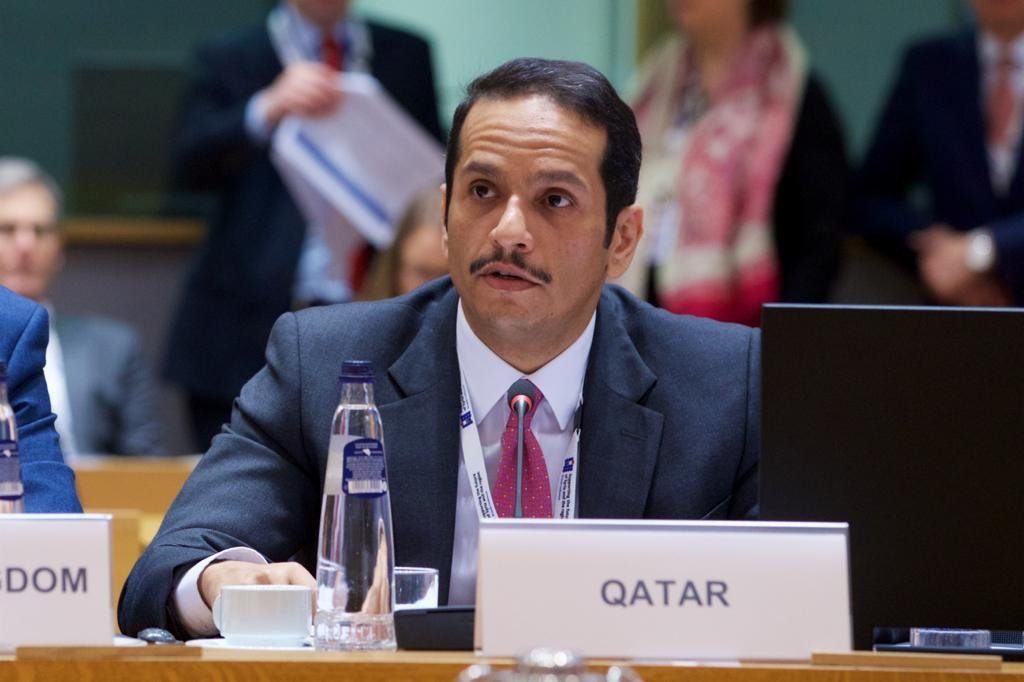The Qatari official added that Doha has been warning over the expansion and the spillover of the war in Gaza on the region, listing other regional escalations including in Lebanon.
Qatar’s Prime Minister Sheikh Mohammed bin Abdulrahman Al-Thani stressed the need to end the war in Gaza in order to resolve the Red Sea escalations, during his participation at the World Economic Forum on Tuesday.
“If we want to address the issue, we need to address the real, central issue, which is Gaza, in order to get everything else diffused. Otherwise, if we are just focusing on the symptoms and not treating the real issue, it will be temporary,” Sheikh Mohammed, who is also Qatar’s foreign minister, told a panel in Davos.
Escalations in the Red Sea have been on the rise since Yemen’s Houthi rebels captured the Galaxy Leadership on November 19, which is partially owned by an Israeli businessman, following attacks on Israel in response to the war on Gaza.
The Houthis have since vowed to stop every Israel-linked vessel moving from the Israeli Red Sea port of Eilat to Asia, Australia or East Africa. The ships would instead have to take a longer path and manoeuvre the Bab El-Mandeb Strait, consequently paying a heavy additional fee.
“It’s the most dangerous escalation right now, because it’s not only affecting the region, it’s affecting global trade as well. This has changed even how we view international trade, how we view international shipping,” Sheikh Mohammed said.
Ships carrying liquified natural gas are among the vessels that had to either move through the Cape of Good Hope or halt their journey.
Ship-tracking data compiled by Bloomberg on Sunday found that five QatarEnergy shipments had paused since the weekend, when the U.S. and UK launched a barrage of retaliatory airstrikes on Yemen on January 12.
Reuters then reported on Monday, citing LSEG ship tracking data, that four tankers transporting Qatari LNG had resumed their journey.
Speaking at Davos, Sheikh Mohammed noted that military action would “create a high risk of further escalation,” calling for diplomatic dialogue.
The Qatari official added that Doha has been warning over the expansion and the spillover of the war in Gaza on the region, listing other regional escalations including in Lebanon.
Lebanon’s Hezbollah and Yemen’s Houthis, both of which fall under what is known as the ‘Axis of Resistance’, joined in fighting Israel.
Tensions soared in southern Lebanon since the beginning of Israel’s genocide on Gaza on October 7, where Israel has killed more than 24,285 Palestinians in Gaza while injuring 61,154 others.
Meanwhile, Israel has killed more than 135 people in southern Lebanon, according to figures by the Lebanese health ministry, last updated on January 9.
Israel’s killing of senior Hamas leader, Saleh Al-Arouri, in Beirut on January 2 marked another dangerous development in the cross-border attacks. Israel then killed senior Hezbollah commander Wissam Hassan Al-Tawil on January 8.
The flare-up in southern Lebanon between Israel and Hezbollah has triggered fears over another all-out war.
In 2006, Israel waged a deadly 34-day war on Lebanon, killing 1,200 mostly Lebanese civilians. The war ended with Hezbollah forcing Israeli soldiers out after weeks of intense attacks







